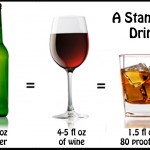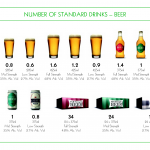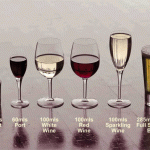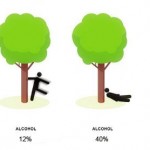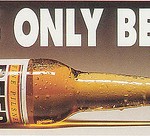Alcohol is the most widely abused psychoactive drug in the United States today. Slang terms include booze, bubbly, firewater, joy juice, sauce, liquid courage, and many others. Legal for those aged 21 and over, drinking is a deeply rooted aspect of our culture. While there are many types of alcohol (an entire class of chemicals), the type that is found in drinks and medicines is known as ‘ethyl alcohol’ or ‘ethanol.’ A yeast enzyme changes the simple sugars that are found in grapes, potatoes, or corn into ethanol – the alcohol found in beer, malt liquor, wine, liquors such as vodka and whiskey, wine coolers, and liqueurs like Irish cream.1 Though many consider alcohol to have stimulant effects, it is actually classified as a depressant – a substance that slows the central nervous system. Other purposes for ethyl alcohol include uses as a chemical solvent, a local anesthetic, and an irritant.
When a person drinks an alcoholic beverage, it is very unlikely that he or she is actually drinking pure alcohol; pure alcohol is extremely potent and takes only a few ounces to raise a person’s blood alcohol level into the danger zone. The ethanol concentration for common types of alcoholic drinks is as follows:2
- Beer: 4-6%
- Malt liquor: 5-8%
- Wine: 7-15%
- Wine coolers: 5-10%
- Champagne: 8-14%
- Hard liquor (Distilled spirits – vodka, rum, whiskey…): 40-95%
- Grain Alcohol: 95-97.5%
What is a Standard Drink?
A standard drink contains 12 grams of pure ethanol – approximately the amount found in one 12 oz. beer, one 5 oz. glass of wine, or one 1.5 oz. ‘shot’ of hard liquor.
- Beer 12 Oz. (1 Can or bottle)
- Wine 5 Oz. (1 Glass)
- Hard Liquor 1.5 Oz. (1 Shot)
In general, it takes the average drinker’s body one hour to metabolize one drink. As the amount of alcohol consumed exceeds the body’s ability to metabolize it, the user’s blood alcohol concentration (BAC) increases, and he or she begins to feel the effects of alcohol intoxication. As one’s BAC continues to increase, the user will experience different levels of intoxication.
Footnotes
1 InTheKnowZone Alcohol Page. http://www.intheknowzone.com/alcohol/index.htm. June 18, 2002.
2 HowStuffWorks Alcohol Page. http://www.howstuffworks.com/alcohol.htm. June 19, 2002.

How do you know how much alcohol is in your drink? Even though they come in different sizes, the drinks above are each examples of one standard drink.
- The concept of a “standard drink” can help you calculate how much pure alcohol you are consuming.
- Number of standard drinks – Beer
- Each of these Standard Drinks contains the same amount of alcohol.
- Attention! Alcohol is harmful to your body!
- It’s only beer. The propaganda against alcohol.
- Alcoholism is a terrible disease.
